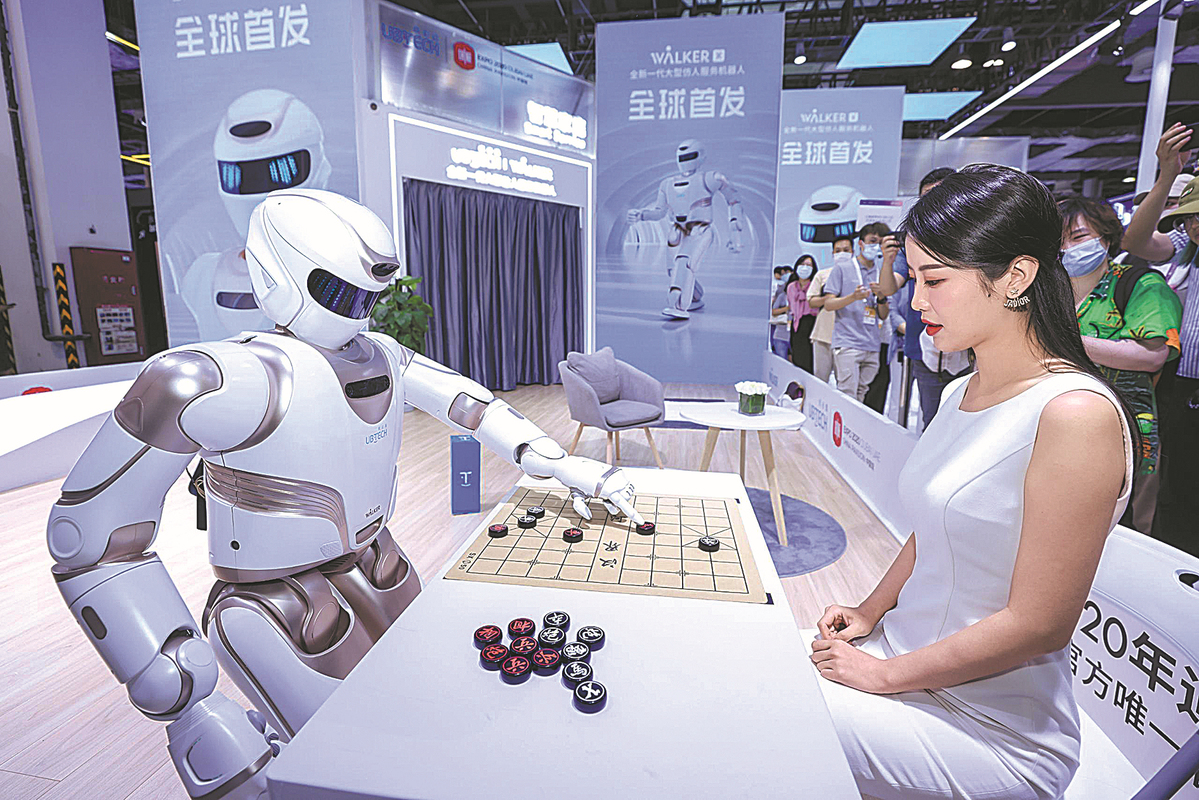AI gaining more ground in China

A humanoid robot called Walker X plays Chinese chess at the World Artificial Intelligence Conference in Shanghai in June, 2021. [Photo/CHINA DAILY]
Artificial intelligence, a key technology for driving digital transformation, is playing an increasingly vital role in accelerating China's push for industrial upgrading and promoting the in-depth integration of the digital economy and real economy, business leaders and experts said.
Significant progress has been made in developing China's AI industry, with technological innovation capabilities in some areas ranking among the best in the world, they said.
A Stanford University report showed that China filed more than half of the world's AI patent applications last year and the nation continued to lead the world in the number of AI journals, conference papers and related publications.
The report said Chinese researchers have been the most prolific in recent years, publishing 27.5 percent of all AI journal articles worldwide, while researchers from the United States accounted for 12 percent. Articles in Chinese journals also topped those of other nations for citations, an indicator of their scientific importance.
Official data showed that the value of China's core AI industries exceeds 400 billion yuan ($56.6 billion), and the number of related enterprises stands at more than 3,000, with major breakthroughs being made in key core technologies such as smart chips and open-source frameworks.
Chinese technology companies have invested heavily in research and development based on AI. In 2017, Baidu was chosen to lead the establishment of the AI national laboratory in deep learning. Self-driving technologies are important for this national research project.
Robin Li, co-founder and CEO of Baidu, said the application of AI technology is reshaping the industry landscape and will be a transformative force revolutionizing development over the next 40 years.
The goal for the intelligent transformation of industries and society brought by AI is to fulfill people's needs — making technology meaningful only if it serves humanity by creating more value and contributing to society, Li said.
"Baidu's approach to AI technology has always revolved around delivering equitable outcomes by making technology more accessible, providing freedom and possibilities for all," Li said.
The Beijing-based company has filed more than 22,000 AI-related patent applications worldwide as of April, among which over 16,000 patents have been applied in China, and it was granted more than 4,600 AI-related patents in the country.
Tech heavyweight Tencent Holdings launched its AI Lab in April 2016. It emphasizes basic research in computer vision, speech recognition, natural language processing and machine learning.
The tech firm works to put fundamental research to practical use, applying AI to its key businesses, including medicine, social interaction, online games and cloud computing. It also operates Youtu Lab, which has developed advanced technologies in facial and image recognition and voice identification.
Zhou Hongyi, founder of cybersecurity company 360 Security Group, emphasized the significance of pushing forward the digital transformation of micro, small and medium-sized enterprises, or MSMEs, as they are facing mounting pressures and challenges from the shortage of capital, talent and technology.
More efforts should be made to leverage digital technologies to help such enterprises, which are playing a critical part in narrowing income gaps and bolstering the development of the real economy, Zhou said, adding the company will step up efforts to offer SaaS, or software as a service, and help drive the digitalization push of MSMEs.
Xiang Ligang, director-general of the Information Consumption Alliance, a telecom industry association, spoke highly of the nation's intensified efforts to develop digital technologies represented by AI, which will inject fresh impetus into the country's economic growth and speed up digital and intelligent upgrades in enterprises.
The in-depth integration of digital technologies with the real economy will further reinforce China's advantages in global supply chains, he said.
Photos
Related Stories
- China promotes application of AI technology to real economy
- Artificial intelligence makes scientific studies smarter
- AI-powered Chinese chess robot triumphs over grandmasters
- Shanghai rolls out regulation to promote AI industry development
- China-ASEAN AI Computing Center to be launched in Nanning city, Guangxi
Copyright © 2022 People's Daily Online. All Rights Reserved.









